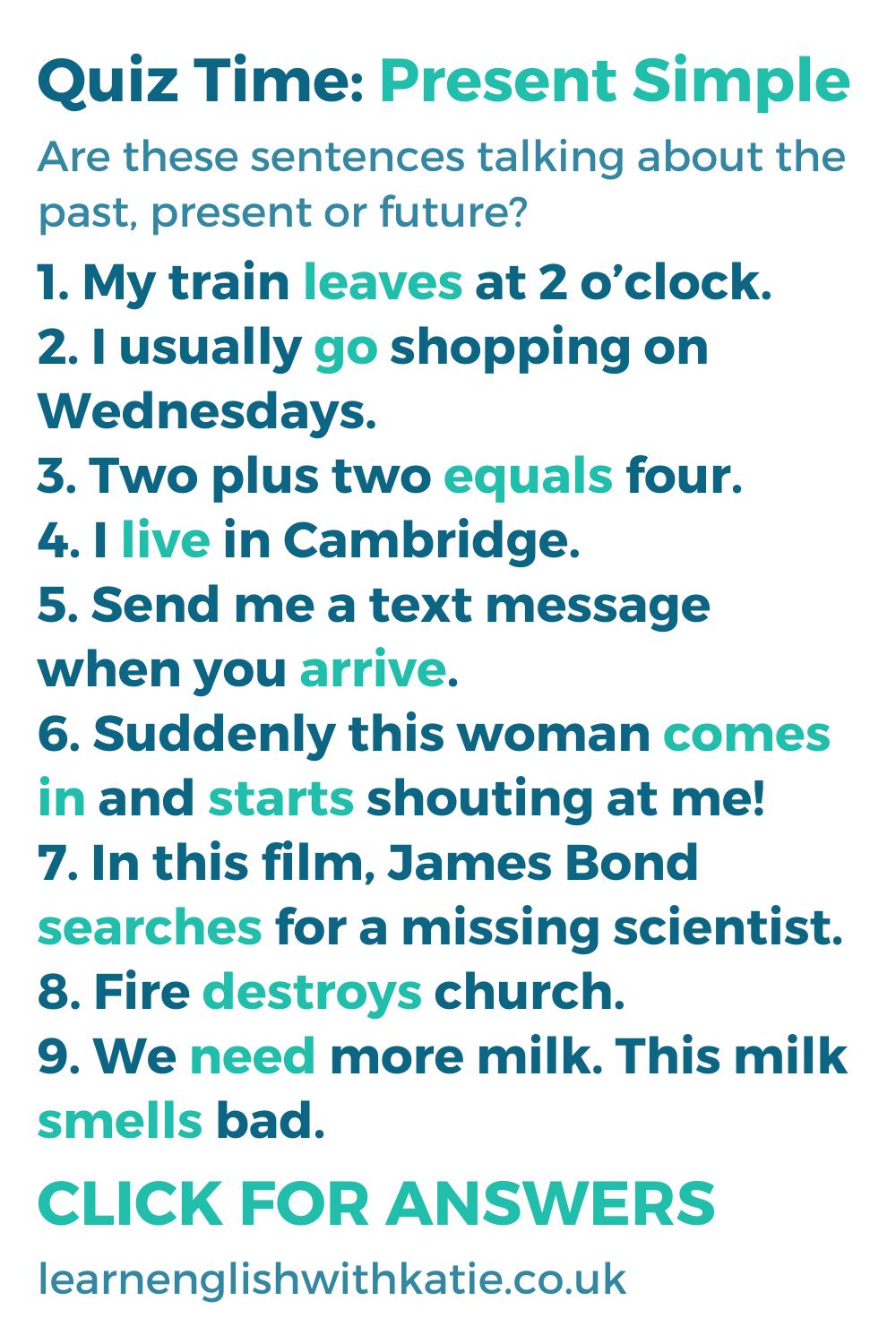|
The present simple is easy, right? Are you sure? It’s the first tense that English students learn but it’s also one that causes problems and confusion, even at higher levels. Have a look at these sentences. Are we talking about present time? 1. My train leaves at 2 o’clock this afternoon. 2. I usually go shopping on Wednesdays. 3. Two plus two equals four. 4. I live in Cambridge. 5. Send me a text message when you arrive. 6. Suddenly this woman comes in and starts shouting at me! 7. In this film, Daniel Craig plays James Bond for the last time. He searches for a missing scientist. 8. Fire destroys church. 9. We need more milk. This milk smells bad. Keep reading to check your answers. Answers 1. My train leaves at 2 o’clock this afternoon. You can use the present simple to talk about the future, especially for scheduled events like trains, cinemas, appointments and timetables. 2. I usually go shopping on Wednesdays. This is not talking about now but every Wednesday, past and future. 3. Two plus two equals four. This is always true: past, present and future. 4. I live in Cambridge. This is also true in the past, present and future. It is not absolutely permanent like number 3 but it is long-term. I haven’t always lived in Cambridge and I may move elsewhere in the future. 5. Send me a text message when you arrive. In future time clauses starting with words like “when” and “if”, we use the present simple even though we are talking about the future. 6. Suddenly this woman comes in and starts shouting at me! We sometimes use the present simple to tell a story about the past. This has the effect of making it sounds more direct and more exciting or dramatic. 7. In this film, Daniel Craig plays James Bond for the last time. He searches for a missing scientist. We often use the present simple to describe books and films. The first sentence is actually about the past. In fact, I could say Daniel Craig played James Bond for the last time. The second sentence is part of the plot, which is usually described using the present simple. However, I would probably use the past tense to describe the making of the film, e.g. it was directed by Fukunaga. 8. Fire destroys church. Newspaper headlines often use the present simple to describe past events. This saves space on the page and adds drama. 9. We need more milk. This milk smells bad. In this sentence, we are actually talking about now! So the present simple isn’t always used to talk about the present (now). In fact, it’s important to understand that “verb tenses” are not “times”. If you remember this, it will help to avoid a lot of confusion. The present simple isn’t always simple either. How often do you forget the “s” after “he” or “she”? How often do you add an “s” when you shouldn’t? Questions and negatives are actually more complicated in the present simple than in other tenses because you have to know when to use “do”, “does”, “don’t” and “doesn’t” and when you don’t! Perhaps we should change the name of this tense from “present simple” to something else, although I don’t know what! Further reading You might like to read this post to learn more about the present simple and the most common mistakes to avoid. It's the first in a series about all the tenses in English. You can also try this quiz to see if you really know how to use the present simple. For a free list of irregular verbs, arranged in easy-to-learn groups, click the button below.
0 Comments
Your comment will be posted after it is approved.
Leave a Reply. |
About the blogFollow the blog for mini lessons and tips on how to improve your English. Categories
All
Archives
July 2024
|

 RSS Feed
RSS Feed
